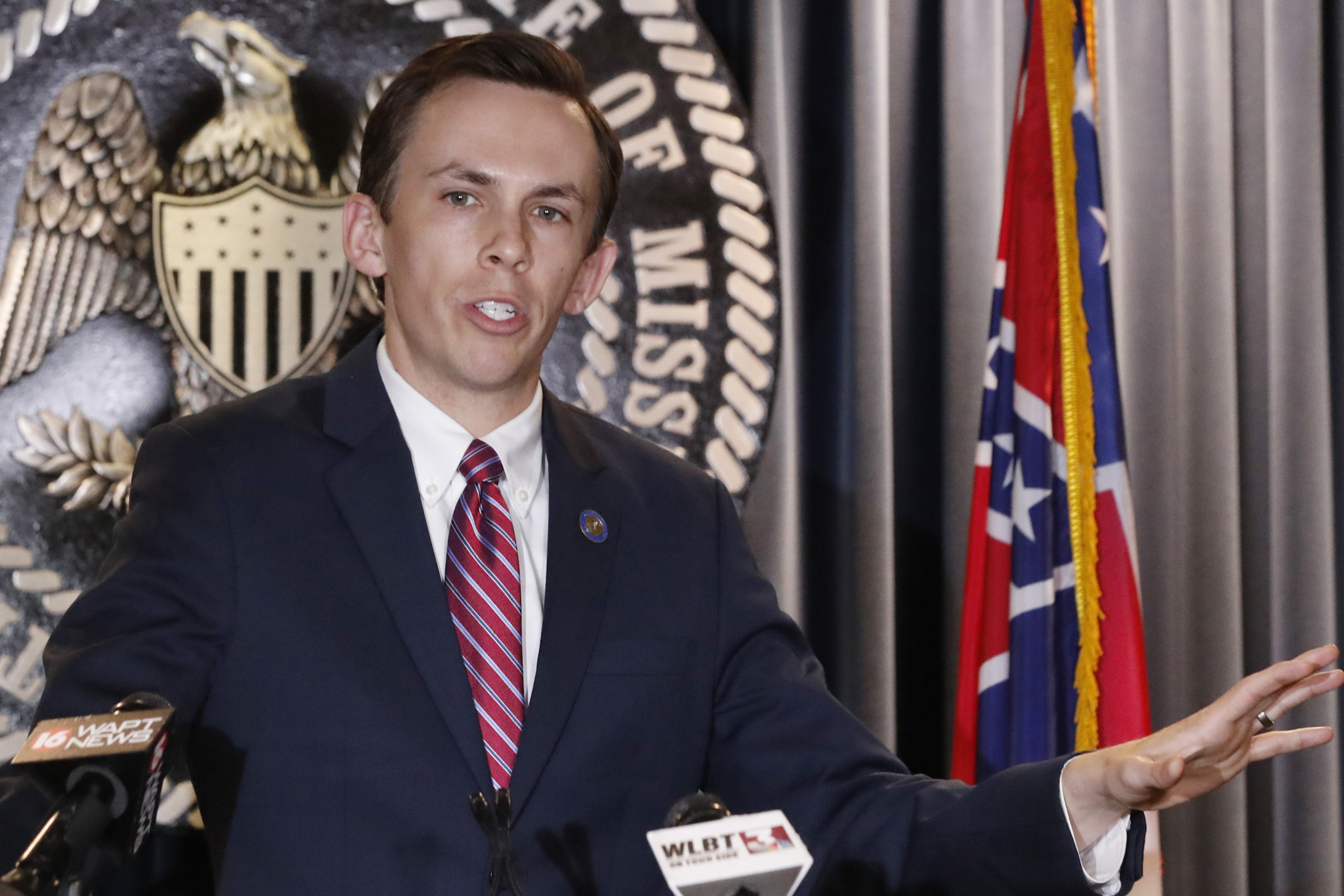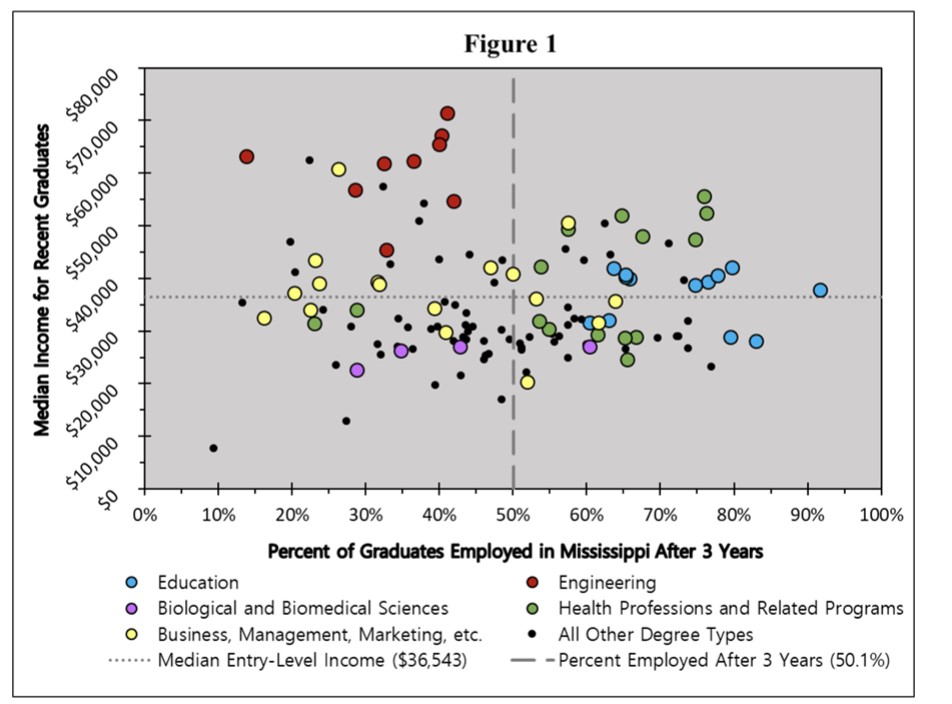Mississippi Today
Auditor’s proposal to defund some college majors catches fire online, but are lawmakers interested?

Buoyed by a series of tweets from State Auditor Shad White belittling certain liberal arts degrees as “garbage,” “useless” and “indoctrination factories,” a recent report from his office calls for Mississippi to change how it funds higher education by stripping public money from programs that don’t support the state’s economy in favor of those that do.
But in an interview Friday afternoon, two days after the report was released, White said he could not think of any lawmakers who had reached out to him about setting up a committee — the report’s central recommendation — to study revamping higher education funding in Mississippi.
“I’m wracking my brain,” he said. “Not a ton (have reached out) because it’s just been out for two or three days.”
White said he expects some inquiries but his guess is that hard copies of the report, which were prepped for a number of powerful elected officials — the governor, the lieutenant governor, the speaker of the house and members of key legislative committees — haven’t arrived in the mail yet.
The state auditor’s office does not have policy-making power, so for now, White is reliant on champion lawmakers to turn his recommendations into reality.
“I’m trying to think if a legislator has texted or called me,” White said. “I don’t recall any right offhand that specifically mentioned the report.”
The eight-page report is part of a yearlong effort by the auditor’s office to propose solutions to Mississippi’s intractable “brain drain,” the phenomenon in which college-educated people leave the state for better-paying opportunities elsewhere, in effect subsidizing the economy’s of nearby states.
If Mississippi could retain just a few more graduates seeking highly paid jobs like engineering, the report said it would be a multimillion-dollar boon to the economy.
“State appropriations should focus on the degree programs our state’s economy values most,” the report states. “Otherwise, taxpayers will face the repercussions of an inadequate workforce and a declining population.”
The brain drain is an issue that has concerned lawmakers across the political spectrum and, in recent years, led to bipartisan proposals in Mississippi to incentivize graduates to go into crucial fields, like teaching and nursing, that are experiencing dire shortages.
State agencies already have some policies that take this into account. The Institutions of Higher Learning, which oversees public universities in Mississippi, evaluates programs based on the state’s workforce needs. The state’s community colleges are trying to expand workforce development programs.
What White is proposing goes further. Though he is not advocating for “abolishing” certain degrees, White said it’s not enough to simply let the market guide Mississippi college students to degrees that lead to higher-paying jobs — which, by and large, is what’s already happening.
Rather, state government intervention is necessary to ensure taxpayers are seeing a return on investment in higher education, White said.
“What I’m suggesting is that we take a hard look at how we’re spending money, and we add more money to those programs of study,” he said, “by … taking those dollars away from programs of study that aren’t economically beneficial to taxpayers.”
Toren Ballard, an education policy analyst at Mississippi First, said it’s important to understand that taxpayers are not really footing the bill for the state’s universities. This year, state appropriations comprised just 21.5% of IHL’s operating budget.
As state funding for higher education has plummeted since 2000, the cost of tuition has ballooned, putting the onus on Mississippians to pay for college, leading them to choose career paths that help them afford it, Ballard said. That’s one reason he thinks the report’s recommendation is largely unnecessary, though he hopes it could lead to more funding for higher education.
“I think we’re not giving enough credit to individual student decision making here,” Ballard said.
Al Rankins, the IHL commissioner, seemed to agree. In a statement, he said it would “appear more productive” to address Mississippi’s brain drain by creating more career opportunities.
“University students are adults who choose their majors based on their interests and career aspirations,” he said. “After graduating some choose to pursue opportunities in other states for a myriad of reasons outside of the control of our universities.”
White said that when he was choosing his undergraduate major — political science and economics from the University of Mississippi — that he wished he had access to data showing what he could expect to make when he graduates.
“If I had to think it over again, I would rethink majoring in political science,” he said.
So what degree programs does Mississippi’s economy value most, according to the auditor? The report begins with a graph that measures value as a trade-off between the median income a graduate can expect to make and the likelihood they will stay in Mississippi.

In the top-left corner of the graph are higher-paid graduates who are more likely to leave, like business and engineering degrees. The top-right corner shows higher-paid graduates who were very likely to stay, including health professions and teachers. “All other degree types” are largely in the middle.
Right now, the report says, the state funds all those degrees at the same amount, even though some degrees cost more to offer.
Ballard noted the report did not consider graduates who go directly to law school or medical school, potentially lowering the median income of majors like sociology that the auditor denigrated online.
“That’s why engineering degrees look particularly good here,” he said.
White said the goal of the report — and his social media posts — was not to be comprehensive but to “initiate a conversation around this question.”
But that doesn’t mean he’s taking back anything he wrote.
“I’m defending it,” he said. “I’m telling you that we have to address these ideas in a way that is plain and clear, and if you shroud it in technocratic jargon, nobody will care.”
This article first appeared on Mississippi Today and is republished here under a Creative Commons license.
Did you miss our previous article…
https://www.biloxinewsevents.com/?p=290146
Mississippi Today
Government secrecy tends to bite Mississippi in the butt. It’s happened again
The state Senate Republican leadership didn’t plan to fail on a Mississippi tax overhaul. It failed to plan.
And when pressed late in the 2025 legislative session to come up with a proposal to counter the House Republican leadership’s sweeping bill, Senate leaders did so behind closed doors and hurriedly.
The result: a majority of legislators passing a tax overhaul bill full of math errors that accidentally did what Senate leaders didn’t want. And it stripped out safeguards for taxpayers that both the House and Senate leadership said were prudent.
No matter how much Gov. Tate Reeves praises House Bill 1 as “one big, beautiful bill,” borrowing a phrase from President Trump as he signed it into law, it was passed through secrecy, subterfuge and error, not representative democracy.
Had the Senate perhaps taken a little more time, allowed more input from and access to its strategizing from rank-and-file lawmakers, and who knows, maybe even a little crowd-sourcing allowing the public to scrutinize the bill before passing it, maybe the blunder could have been prevented.
READ MORE: OOPS! Senate sent House an income tax bill with typos. House ran with it. What’s next?
And while House leaders should receive praise for coming up with an initial public-facing tax overhaul plan through months of public hearings and forums, that’s not what was passed into law. House leaders played a game of secret squirrel to pass the Senate’s mistakes into law. Then instead of negotiating in good faith to fix the problems, House leaders tried to shanghai the Senate in backroom negotiations to pass a few plums they wanted, such as legalized online sports betting and a sales tax increase.
The end result: Historically bitter infighting among state GOP leaders to the point they couldn’t even pass a state budget, their main job. And we have communications between Mississippi’s top legislative leaders and governor, all Republicans, that these days are often reduced to mean tweets or Facebook posts about each other, not earnest negotiations.
READ MORE: The Typo Tax Swap Act of 2025 may be the most Mississippi thing ever
Mississippi government’s default setting is secrecy, from public records and meetings to access to elected officials, and it has never served our citizens well. From a black-ops agency that spied on its citizens for nearly two decades to festering, generational government corruption that has cost taxpayers hundreds of millions of dollars, secrecy is neither good politics nor good policy.
Major, sweeping state policy should be conducted in the open and with public input. But as the national and world economies plunge into turmoil that is sure to impact Mississippi, our new tax code lacks safeguards that both House and Senate leaders said were needed — all because of secrecy and lack of planning and communication.
This article first appeared on Mississippi Today and is republished here under a Creative Commons Attribution-NoDerivatives 4.0 International License.
Mississippi Today
Ward 6 council candidates face the image of south Jackson versus the reality
Driving down roads in south Jackson in recent weeks, residents were inundated with placards of smiling faces and names in bright, bold fonts of people hoping to be the next Ward 6 councilman.
In some neighborhoods, the streets were as littered with campaign signs as they are overgrown lots and abandoned properties in between neatly kept homes.
“The homes in the surrounding area and businesses in Ward 6 have been decimated. It looks like a bomb went off,” said Sylvia Walker, Ward 6 board member for the Jackson Association of Neighborhoods. “We’ve seen the businesses hollow out and nothing come back in. It’s disheartening. It’s sad.”
Walker said the image of south Jackson must be interrogated. Not enough people are talking about the good happening in Ward 6, she said.
“South Jackson is very diverse and not just one specific area,” said Walker. “I think the biggest misconception is that south Jackson is just full of dilapidated homes, and the people are poverty-stricken and destitute, and that’s not true.”
Ward 6 has the largest population of Jacksonians, with just over 23,000 people. It also has the highest number of Black residents, according to data from the City of Jackson’s website.
Jackson also has a high number of abandoned properties owned by the state. According to data from the Secretary of State’s office, there are about 1,900 tax-forfeited properties in the City of Jackson.
There will be a Democratic runoff on April 22 between two candidates for the Ward 6 city council seat. Emon Thompson Sr. garnered 714 votes and Lashia Brown-Thomas came in second with 652 votes. Voter turnout was low, with less than 3,200 votes cast in a ward with a voting age population of more than 16,000. There were nine contenders for the coveted council seat, more than any other council race.
Candidates for the coveted Ward 6 seat envision a more beautiful, thriving south Jackson. After a stacked primary, two candidates have made it to the runoff to replace Aaron Banks, former council person who faces criminal charges for allegedly accepting cash bribes in exchange for his vote on a development project. He pleaded not guilty.
Banks is familiar with the image problem in south Jackson. He said he’s made progress with more demolitions and landscaping work done than others in the past. This includes the demolition of Casa Grande Apartments and Appleridge Shopping Center.
“I’ve always said that I would serve two terms, and we got a lot of work done,” Banks said in a recent interview with Mississippi Today.
Brown-Thomas said that crime and blight are the biggest issues affecting Ward 6. The law enforcement officer wants to hold people accountable for their part in the perceived image of a decaying south Jackson.
“The city has codes, and if these people are not holding up to the codes, they need whatever punishment there is,” Brown-Thomas said. “If they aren’t holding the property up, then they should not have the property.”
She said that if she’s elected, she’ll work to get police officers higher wages, and will remain transparent and available to constituents.
“It’s not going to happen overnight, but it will take some time,” Brown-Thomas said. “I’m not saying it’s going to come in a year, not even two years, but we have to address the issues first, then everything else will fall in line.”

Thompson Sr., a business owner and retired veteran, said that a lot of the issues with blight comes down to enforcement.
“We need to, first of all, clean up our blighted properties by using the laws that we already have,” Thompson said. “The city already has ordinances with enough teeth to deal with blight.”
South Jackson voters don’t turn out like they should, he said, which can lead to a distrust in the system. He hopes, if elected, to be able to reach constituents where they are and keep them a part of the process in restoring their communities, like water improvement or curbing crime.
“Out of the 40 something thousand people that’s in south Jackson, maybe 3,900 people vote in the municipal elections,” he said. “They don’t have faith in the government anymore.”
“…If there’s a reason why we’re not getting any services out here, then I want to make sure I communicate that with a constituent so they can continue to have hope,” he said.
Representative Ronnie Crudup, Jr., D-Jackson, said that residents’ migration out of Jackson creates bigger issues for communities.
“To me, blight is just a symptom of a larger problem. The people are leaving the city of Jackson, and the population is decreasing,” Crudup said. “When people leave the properties, you end up with squatters and vagrants who move into these properties and tear them up.”
Crudup has been renovating and demolishing blighted properties in south and west Jackson for nearly eight years. So far, he said he’s renovated about 35 homes.
“Even though we are demoing and tearing down one or two properties, when people leave, that leaves other ones there,” he said. “You got all these blighted properties all around south and west Jackson, and some even in parts of north Jackson now, because people are leaving.”
He said the one thing that’s needed most: more funding from all levels of government for blight mitigation work.
“There needs to be more money from the legislature, but there needs to be more money allocated from the city council too,” Crudup said. “I think the city is going to have to take clean up efforts to a higher circumstance, and let the legislature see that they’re serious about this, and also get the county involved and let them know ‘Hey, we need all the help we can get.’”
And, the perception that city leaders have abandoned south Jackson is not necessarily right. Former Jackson Mayor Harvey Johnson said that blight is an issue that affects not only south Jackson but all parts of the city. Mitigating blight is going to take an intergovernmental approach, he said.
“I know that in some cases, some people feel they’ve been sort of abandoned, but I don’t think that’s the case,” Johnson said. “It may be a lack of resources to attack the problem and it’s going to require all governments to work together.”
Walker said she remembers when the city’s southern boundary changed and her neighborhood, which had been part of Byram, came inside Jackson city limits. A small portion of her ward was annexed by the city of Jackson in 2006 as part of Byram’s reincorporation. In the last couple of decades, she said she’s seen people be forced out of their homes due to the recession. Others simply chose to leave.
“We’ve had a turnover, but the neighborhood is still relatively stable,” Walker said. “When we moved in, a lot of people moved out.”
Walker said that while her neighborhood isn’t struck by blight, she sees abandoned properties while making her way through the community and near her church.
When thinking of a candidate that she would want to vote for, Walker said she’s looking for a good communicator who can be an advocate for the ward.
“We need someone that’s forward thinking. Someone that has the best interests of the residents of south Jackson and an understanding of the vast diversity of the ward,” she said. “Someone that’s able to work with other members of the City Council. Someone able to work with our board of supervisors and state legislators to find solutions to some of these issues.”
Banks said that his greatest achievement as city councilman was hosting quarterly town hall meetings to inform his constituents on the importance of ordinances and legislation created to better their lives.
“There’s one piece of legislation that deals with overhanging tree limbs and limbs. That idea came from a constituent,” he said. “When you see constituents being able to give informed ideas on legislation, which is the job of a council member, I think that’s an achievement because then what that says is there’s involvement in the process.”
“I hope the next person will understand that communicating with the people is key, and that the people of Ward 6 are resilient,” Banks said. “As long as they continue to communicate and stay in the scope of their job and work with the administration, there’s a lot that can be done.”
This article first appeared on Mississippi Today and is republished here under a Creative Commons Attribution-NoDerivatives 4.0 International License.![]()
Mississippi Today
On this day in 1962, white cop killed Cpl. Roman Ducksworth
April 9, 1962

Cpl. Roman Ducksworth Jr., a 27-year-old Black military police officer stationed at Fort Ritchie, Maryland, was traveling home by bus to Mississippi. His wife, Melva, was expecting their sixth child and was now in the hospital because of complications.
By the time he arrived home in Taylorsville, Mississippi, he had fallen asleep. The driver called William Kelly, a white police officer onto the bus to wake him. Kelly instead arrested the serviceman, claiming he was drunk.
Off the bus, the two struggled, and the officer shot twice, striking Ducksworth in the chest. He died without knowing his wife had just given birth to a healthy baby girl. Kelly claimed he shot Ducksworth in self-defense, and he was never prosecuted.
Later he sent a message to Ducksworth’s father: “If I’d known it was your son I wouldn’t have shot him.” The father replied, “I don’t care whose son it was, you had no business shooting him.”
More than 2,000 attended the funeral for Ducksworth, who was buried with full military honors, including a 16-gun salute by an integrated honor guard. He is among 40 martyrs listed on the Civil Rights Memorial in Montgomery, Alabama.
This article first appeared on Mississippi Today and is republished here under a Creative Commons Attribution-NoDerivatives 4.0 International License.![]()
-

 News from the South - South Carolina News Feed6 days ago
News from the South - South Carolina News Feed6 days agoSouth Carolina clinic loses funding due to federal changes to DEI mandates
-

 News from the South - Kentucky News Feed7 days ago
News from the South - Kentucky News Feed7 days ago3 killed in fiery Lexington crash temporarily shuts down portion of New Circle Road
-

 News from the South - Alabama News Feed7 days ago
News from the South - Alabama News Feed7 days agoMobile defendants sentenced to life in prison for murder-for-hire conspiracy
-

 The Center Square5 days ago
The Center Square5 days agoCA fails audit of federal programs, 66% of COVID unemployment benefits in question | California
-

 News from the South - Arkansas News Feed5 days ago
News from the South - Arkansas News Feed5 days agoArkansas prison board approves contractor search for Franklin County prison
-

 News from the South - Kentucky News Feed7 days ago
News from the South - Kentucky News Feed7 days agoDrug Task Force investigates “vape shops,” uncovers over 100lbs of marijuana
-

 News from the South - Georgia News Feed6 days ago
News from the South - Georgia News Feed6 days agoBond hearing for man accused of murdering pregnant ex | FOX 5 News
-

 News from the South - Alabama News Feed5 days ago
News from the South - Alabama News Feed5 days agoAlabama House passes public school cell phone ban












































